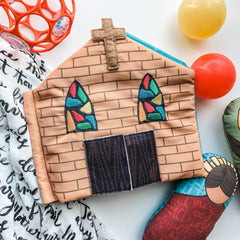When we talk about spiritual gifts, we're really looking at how God equips His people to live faithfully and serve others. So, what are the spiritual gifts in the Bible?
In Catholic teaching, these include both the seven gifts of the Holy Spirit, which strengthen our inner life, and the charisms, which are unique graces given for the good of the Church. Together, they guide us in making wise choices, deepening our understanding, and building up our communities.
In this article, we'll explore what these gifts are, look closely at the seven traditional gifts, and walk through simple steps for identifying our own.
What this article covers:
What Are Spiritual Gifts?
Spiritual gifts are special graces from the Holy Spirit, given so the Church can grow and thrive. They're meant to serve others, whether that's by teaching, encouraging, organizing, or bringing comfort in difficult moments.
In Catholic teaching, we speak of charisms, which are unique gifts for mission, and the Seven Gifts of the Holy Spirit, which shape our inner life and guide us toward holiness.
Charisms might look like a gift for hospitality that makes people feel welcome at parish gatherings, while the seven gifts provide lasting strength in daily prayer and decision-making. Together, they help us live our faith with joy and purpose.

What Are the Seven Spiritual Gifts?
Catholics name seven gifts from Isaiah 11:2–3 listed explicitly in the Catechism: wisdom, understanding, counsel, fortitude, knowledge, piety, and fear of the Lord. Some translations render “fear of the Lord” as “wonder and awe,” and a duplication in ancient versions yields the traditional count of seven.
1. Wisdom
Wisdom helps us see life as God sees it. This gift doesn't only touch lofty theology; it shapes everyday choices like how to guide our children, balance work with faith, and even how we spend our time. It draws our attention away from what fades quickly and steadies us toward what lasts forever.
A person with wisdom knows when to pause, when to speak, and when to act in love. It's a gift worth praying for daily, and having a Bible verse scripture gift in your home can serve as a beautiful reminder of its importance.
2. Understanding
Understanding digs deeper than surface-level knowledge. It allows us to grasp the truths of faith in a way that warms the heart, not just fills the head. Think of the moments when Scripture suddenly makes sense in a new way or when Church teaching connects with daily life. That's understanding at work.
It's especially helpful when questions come up, whether from children asking how many books are in the Bible or from friends curious about what Catholics believe. This gift builds confidence in what we know and encourages us to share it with others.

3. Counsel
Counsel, also called right judgment, is a gift that brings clarity when we face difficult decisions. It's the gentle nudge to choose the path that keeps us close to God rather than one that simply looks convenient. Parents may feel it when guiding their teenagers through tough choices, or friends may rely on it when asked for advice.
Counsel equips us to listen to God's Spirit and then speak truthfully and lovingly. It also strengthens us to encourage others without fear of being misunderstood.
4. Fortitude
Fortitude is holy courage in action. It helps us stay strong in faith even when it's unpopular or hard. This gift shows up when we continue to serve at church despite exhaustion, when we stand up for someone being treated unfairly, or when we hold on to prayer in seasons of suffering.
Fortitude doesn't remove the challenge, but it gives us the strength to endure it faithfully. With this gift, ordinary believers can quietly persevere and make an extraordinary impact in their families and communities.
5. Knowledge
Knowledge allows us to see the world in the light of God's truth. It reminds us that creation reflects His goodness and that every person carries dignity. This gift keeps us from being swept up in confusion or error by grounding us in what's real and lasting. It also inspires us to connect the dots between faith and everyday life.
Whether we're learning more about how many books are in the Bible or reflecting on what those books teach us, knowledge keeps us rooted in what draws us closer to God.

6. Piety
Piety turns duty into devotion. It's the gift that moves us to pray with love, not just habit, and to serve with joy, not reluctance. Piety shows itself in small things, like teaching children to fold their hands in prayer or helping a neighbor without expecting thanks. It builds gratitude in the heart and nurtures a spirit of reverence in the home.
Families who cultivate this gift find that faith becomes more than Sunday Mass; it becomes a daily rhythm filled with love, service, and mercy.
7. Fear of the Lord
Fear of the Lord is better understood as wonder and awe. It's the deep awareness of God's majesty that keeps us humble and helps us avoid anything that might distance us from Him. This gift doesn't push us into fearfulness but instead into reverence. It shapes the way we worship, the way we treat others, and even the way we view ourselves.
By remembering God's greatness, we keep our lives oriented toward Him. A verse displayed on a scripture gift at home can be a daily reminder of this awe, helping us carry it into prayer, work, and family life.
Charisms
Alongside the seven gifts, Catholic teaching also recognizes charisms, which are special abilities given to each person for the good of the Church. Unlike the seven gifts, which are permanent dispositions, charisms are practical and varied.
They might include teaching, mercy, administration, healing, generosity, or encouragement. A person with the charism of hospitality, for example, can naturally create a sense of belonging for newcomers at a parish event. Someone with the charism of intercession may feel deeply called to pray for others and often sees those prayers bear fruit.
These gifts are not for personal glory but for building up the Body of Christ, and they help every member find a unique place in God's mission.

How to Identify Your Spiritual Gifts
You may notice a mix: the seven gifts shaping your holiness and specific charisms energizing your service. Here's a simple, Catholic-friendly path to discernment:
Step 1: Pray for Light
Start with prayer. Ask the Holy Spirit to reveal how He's already working in your life and what He wants to grow. A simple prayer in the morning or before reading Scripture can open your heart to clarity and peace. If you're unsure how to begin, start with familiar prayers and ask God to guide you as He guided the writers of the most important books in the Bible.
Step 2: Immerse Yourself in Scripture
Scripture provides the foundation for understanding spiritual gifts. Spend time with passages like Romans 12 or 1 Corinthians 12, and let them shape how you see God's work in your life. As you read, notice which verses stir something in your heart.
The best books of the Bible to read for this are those that speak directly about the Spirit's action. Over time, the words will help you recognize patterns that align with your own gifts.

Step 3: Watch the Fruit
Spiritual gifts leave evidence. Pay attention to where your efforts consistently bring growth, encouragement, or peace to others. Maybe your teaching leaves someone inspired, or your kindness makes a tough day easier for a friend.
This fruit is often quiet but unmistakable. It helps you see how God's grace flows through your life. Even as you reflect on how many gifts exist, remember the most important books in the Bible remind us they're given to strengthen the whole Church.
Step 4: Ask Your Community
Others often see what we can't. Ask friends, mentors, or your parish priest when they've noticed your service making a difference. Their honest reflections can shine light on your strengths. This isn't about collecting compliments.
It's about learning how your gifts have blessed others and where you might be called to grow. Their perspective is a gift too, rooted in the same faith traditions we find in the best books of the Bible to read.
Step 5: Experiment in Service
Don't be afraid to try. Volunteer to teach, help organize a parish event, pray with others, or welcome newcomers. Testing different ministries shows you where joy and fruit naturally follow. If something feels life-giving and others are encouraged, that's often a clue. It's normal to try a few areas before finding what fits.
Remember, the most important books in the Bible show us that serving others is central to living as part of Christ's body.

Step 6: Use Assessments Wisely
Spiritual gift inventories or questionnaires can be helpful, but they're not the final word. Think of them as conversation starters. They may reveal patterns that affirm what you've already sensed or suggest areas to explore.
Still, gifts are truly discovered in lived experience, not just on paper. Keep serving, keep praying, and test the results against your community's feedback.
Step 7: Discern with the Church
Discernment happens best within the Church. If you're unsure how a gift is meant to be used, seek guidance from your pastor or a trusted spiritual director. They can help confirm what you're experiencing and make sure it aligns with God's call. The Church has always treasured the seven gifts of the Holy Spirit and the charisms.
Conclusion
Spiritual gifts are God's way of strengthening His people for holiness and service. The seven gifts of the Holy Spirit help us grow steady in faith, while charisms equip us to serve in unique and practical ways. When we pray, read Scripture, watch the fruit of our lives, and seek guidance in the Church, our gifts become clearer and more effective.
If you'd like meaningful reminders of faith to keep in your home, explore the Scripture-inspired pieces at The Little Rose Shop's catholic store.



